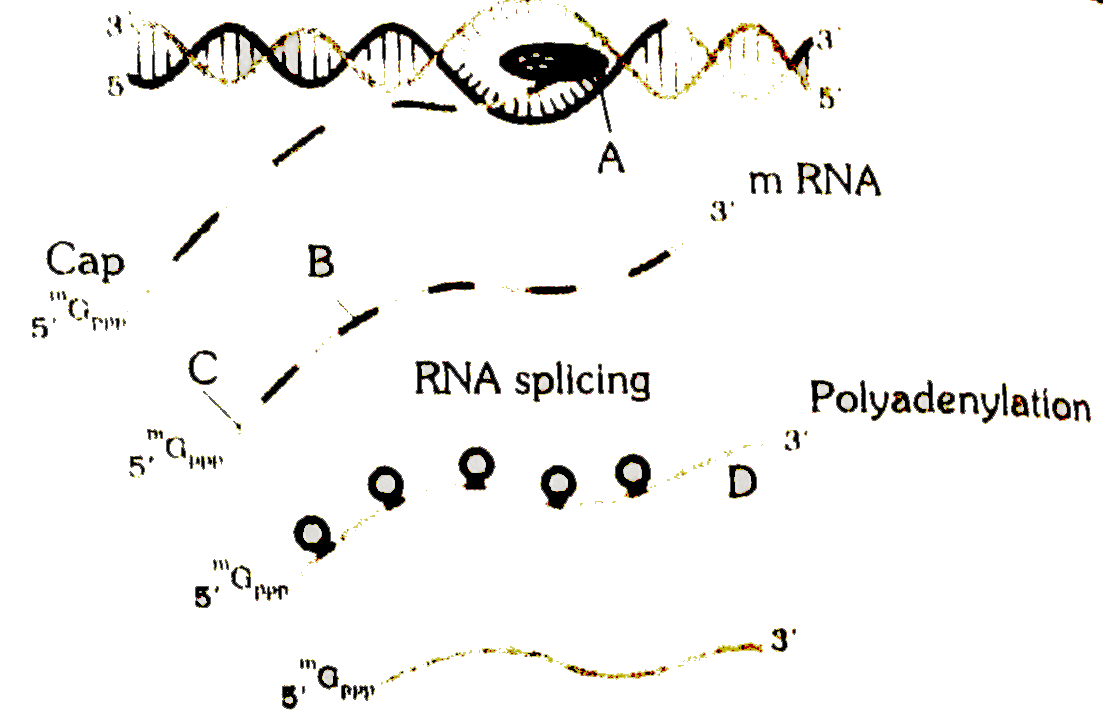What is the role of RNA polymerase III in the process of transcription in eukaryotes?
Transcribes precursor of mRNA
Transcribes only snRNAs
Transcribes rRNAs (28S, 18S and 5.85)
Transcribes tRNA, 5s- rRNA and snRNA
Step-by-Step Solution:
1. Understanding RNA Polymerases in Eukaryotes:
- Eukaryotic cells have three distinct RNA polymerases (RNA Polymerase I, II, and III) that are responsible for transcribing different types of RNA.
2. Identifying the Role of RNA Polymerase III:
- RNA Polymerase III (Pol III) specifically transcribes small RNA molecules. Its primary functions include the transcription of:
- Transfer RNA (tRNA): This type of RNA is crucial for protein synthesis as it carries amino acids to the ribosome.
- 5S ribosomal RNA (5S rRNA): This is a component of the ribosome, which is essential for protein synthesis.
- Small nuclear RNA (snRNA): These are involved in the processing of pre-mRNA in the nucleus.
3. Exclusion of Other RNA Types:
- It is important to note that RNA Polymerase III does not transcribe precursor mRNA (which is transcribed by RNA Polymerase II) or ribosomal RNA (rRNA) in general (which is transcribed by RNA Polymerase I, except for 5S rRNA).
4. Final Answer:
- Therefore, the role of RNA Polymerase III in eukaryotes is to transcribe tRNA, 5S rRNA, and snRNA. The correct answer is option 4: "Transcribed tRNA, 5S rRNA, and snRNA."
- Eukaryotic cells have three distinct RNA polymerases (RNA Polymerase I, II, and III) that are responsible for transcribing different types of RNA.
- RNA Polymerase III (Pol III) specifically transcribes small RNA molecules. Its primary functions include the transcription of:
- Transfer RNA (tRNA): This type of RNA is crucial for protein synthesis as it carries amino acids to the ribosome.
- 5S ribosomal RNA (5S rRNA): This is a component of the ribosome, which is essential for protein synthesis.
- Small nuclear RNA (snRNA): These are involved in the processing of pre-mRNA in the nucleus.
- It is important to note that RNA Polymerase III does not transcribe precursor mRNA (which is transcribed by RNA Polymerase II) or ribosomal RNA (rRNA) in general (which is transcribed by RNA Polymerase I, except for 5S rRNA).
- Therefore, the role of RNA Polymerase III in eukaryotes is to transcribe tRNA, 5S rRNA, and snRNA. The correct answer is option 4: "Transcribed tRNA, 5S rRNA, and snRNA."
Topper's Solved these Questions
Similar Questions
Knowledge Check
The main role of DNA polymerase III is
Aaddition and polymerization of nucleotides from 5' end to 3' end.Bas major repair enzyme form 5' and to 3' end.Cremoval of DNA primer from 5' end.Daddition and polymerization of nucleotides from 3' end to 5' end.RNA polymerase II is responsible for transcription of
ArRNABhnRNACtRNADSnRNARNA polymerase - III synthesize
AtRNAB5.8s rRNAChnRNADBoth (A) and (B)
What is synthesised by RNA polymerase ?
View SolutionRNA Polymerase III transcribe
View SolutionSelect the correct statements regarding the process of transcription in eukaryotes.
(i) The strand of dsDNA which takes part in transcription process is called as coding strand.
(ii) The enzyme RNA polymerase can catalyse polymerisation only in one direction i.e. ,5'→3' .
(iii) An unusual nucleotide methyl guanosine triphosphate is added to the 5' end of hnRNA during capping.
(iv) During tailing process, adenylate residues (200-300) are added at 3' end in a template independent manner.
View SolutionThe given figure refers to the process of transcription in Eukaryotes, A,B,C and D are respectively

View SolutionRNA polymerase II in eukaryotes is responsible for synthesis of :
View Solution